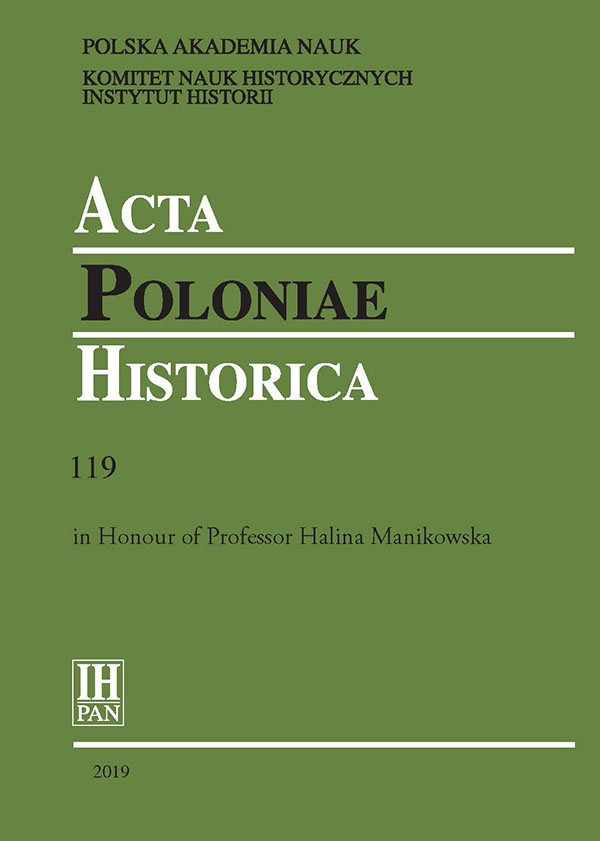Italians in the City of Cracow’s Authorities in the Sixteenth to Eighteenth Centuries
DOI:
https://doi.org/10.12775/APH.2019.119.11Keywords
Italians, Cracow, town council, judicial bench, local government, multiethnic cityAbstract
The article discusses the participation of Italians in the town council and the judicial bench being local government authorities of the city of Cracow in the early modern period. As many as seventy-four Italians (this standing for 14 per cent of all the councillors and 8 per cent assessors or lay judges) are identifiable for the period in question; nineteen of them concluded their careers with the office of assessors, never getting ranked to councillor. While most of them were merchants by profession, as many as five councillors held a doctor’s degree. Italians were the most influential ethnic group in the council in the latter half of the seventeenth century and in the former half of the eighteenth, when in certain years the council-in-office, elected annually and consisting of eight members, featured as many as four Italians at the same time. Similarly, a considerable share of Italians in the judicial bench (almost 50 per cent) is observed for the first half of the eighteenth century; the detailed statistics is featured in the tables appended. Over 20 per cent of the families that accepted the municipal law in the sixteenth to the eighteenth centuries obtained at least one of these offices. The share of Italians in Cracow’s local-government administration at that time, incommensurate with the actual size of local Italian population, is explainable by their larger interest in pursuing municipal career opportunities. In the medieval period, and even under the reign of Queen Bona Sforza, a number of Italians demonstrated different economic strategies. They satisfied themselves with the royal privilege of servitoriate, counted on fast moneymaking and expected to return home sooner or later. In the later years, most of the Cracow-based Italians were well assimilated and preferred to settle down in the city.
References
Bieniarzówna Janina, Mieszczaństwo krakowskie XVII w. (Kraków, 1968).
Bieniarzówna Janina, ‘Rada miejska w czasach saskich’, Rocznik Krakowski, xlvii (1976), 123–35.
Bieniarzówna Janina and Małecki Jan M., Dzieje Krakowa, ii: Kraków w wiekach XVI-XVIII (Kraków, 1984).
Follprecht Kamila, ‘Przyczynki do dziejów krakowskiej rodziny Cellarich’, Krakowski Rocznik Archiwalny, v (1999), 69–84.
Follprecht Kamila, ‘Włosi w elicie politycznej Krakowa do połowy XVII w. Topografia siedzib’, in Zdzisław Noga (ed.), Elita władzy i jej związki z miastami Europy w średniowieczu i epoce nowożytnej. Zbiór studiów (Kraków, 2011), 251–65.
Łysiak Ludwik, Ius supremum Maydeburgense castri Cracoviensis 1356–1794. Organisation, Tätigkeit und Staellung des Krakauer Oberhofs in der Rechtsprechung Altpolens (Frankfurt am Main, 1990).
Manikowski Adam, Il commercio italiano di tessuti di seta in Polonia nella seconda metá del XVII secolo (L’azienda di Marco Antonio Federici a Cracovia, 1680–1683) (Warszawa, 1983).
Noga Zdzisław, Krakowska rada miejska w XVI wieku. Studium o elicie władzy (Kraków, 2003).
Noga Zdzisław, Urzędnicy miejscy Krakowa, Part 2: 1500–1794 (Kraków, 2008).
Ptaśnik Jan, ‘Z dziejów kultury włoskiego Krakowa’, Rocznik Krakowski, ix (1907), 1–147.
Ptaśnik Jan, Gli Italiani a Cracovia dal XVI secolo al XVIII (Romae, 1909).
Quirini-Popławska Danuta, Działalność Sebastiana Montelupiego w Krakowie w drugiej połowie XVI wieku (Kraków, 1970).
Quirini-Popławska Danuta, ‘Rola i znaczenie działalności Włochów w Krakowie od średniowiecza do XVIII w.’, in Zdzisław Noga (ed.), Kraków międzynarodowy (Kraków, 2016), 25–60.
Tygielski Wojciech, Włosi w Polsce XVI–XVII wieku. Utracona szansa na modernizację (Warszawa, 2005).
Maciej Ziemierski, Skład osobowy sądu wyższego prawa magdeburskiego na zamku krakowskim w XVII–XVIII wieku (Kraków, 2013).
Downloads
Published
How to Cite
Issue
Section
License
Title, logo and layout of journal are reserved trademarks of APH.Stats
Number of views and downloads: 285
Number of citations: 0



